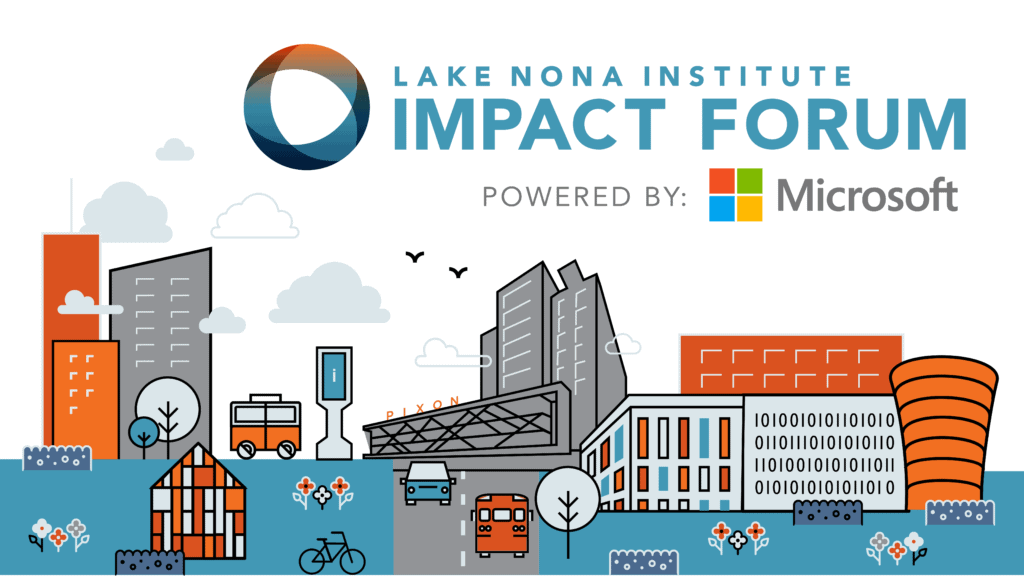On April 22, the Lake Nona Institute, led by Tavistock vice president Gloria Caulfield, held its first-ever online Impact Forum. During the event, leading innovators in the fields of health, medical regulation, and technology considered future approaches to long-term wellness in the wake of the COVID-19 pandemic. Several major themes emerged from the three-hour-long session, whose speakers included familiar faces from earlier Lake Nona Impact Forum sessions, such as former Surgeon General Richard Carmona, Harvard School of Public Health dean of faculty Michelle Williams, operatic soprano Renée Fleming, and soon-to-be Lake Nona resident Deepak Chopra. New faces contributing to the discussion were the CEOs of Verizon and Flagship Pioneering and high-level officials from the National Institutes of Health, European Medicines Agency, and Singapore Ministry of Health. In other words, a high-power array of speakers at the cutting edge of the development and regulation of healthcare at the global scale.

One unifying theme that filtered through the forum presentations was that the pandemic has irrevocably transformed how healthcare is now delivered. Telemedicine appointments, for example, which were relatively uncommon a year ago, are now the norm. Patients like the convenience of telemedicine, which is poised to become a profound driving force in the new, post-pandemic era of healthcare. In other words, there is no turning back to the status quo ante for patients’ access to doctors. One plus of this greater use of telemedicine is that patients will be able to access a greater diversity of doctors through online visits. But serious obstacles remain, as Peter Lee of Microsoft and Noubar Afeyan of Flagship Pioneering eloquently described at the opening of the forum. Data on patients are mostly collected efficiently, but the data are poorly organized for extraction and use by doctors and caregivers. Desperately needed are common platforms for the interoperability of medical systems for data retrieval. Lee lamented that startups that design effective medical systems for one organization find that they have to start from scratch to design similar systems for their next client.
Lee further explained how the pandemic has radically changed the way in which scientific research is conducted. The “crisis response science” that arose by necessity over the past 15 months has made science more transparent, more political, and more open to public comment and debate. The deeper implications of this development, however, are as yet unknown.
Expanding on the theme of healthcare transformation, Noubar Afeyan, a co-founder of Moderna, pointed to the unprecedented speed with which vaccines for COVID-19 were developed last year. “How to impose the same level of urgency for other critical health issues?” Afeyan wondered aloud. “We did not know that such speed was possible,” he continued. “But now that we know that such speed is possible, what next?” Much credit for this extraordinary pace of innovation is due to the Food and Drug Administration, without whose cooperation such rapid vaccine development would have been unthinkable. Afeyan hinted at the development of “pan-vaccines,” one example of which – as we understood – could be a vaccine for both the annual flu and a booster against COVID-19.
In introducing a second theme echoed by later speakers, Afeyan spoke of the urgent need for our healthcare infrastructure to “go upstream” in fighting disease. Our medical systems are designed to fight illness once patients are sick. But they must pay greater attention to analysis and, ideally, prevention of the “upstream” conditions that produce the illness in the first place.
A third theme that surfaced at the forum concerned medical regulation. The director of the European Medicines Agency, Emer Cooke, marveled that the urgency of the pandemic had caused the approval of four separate vaccines to fight COVID-19 in 15 months or less. The pandemic galvanized regulators to collaborate more closely to produce such quick but vitally necessary action. Normally, said Elias Zerhouni of the National Institutes of Health, medical regulations are based on local conditions, but the pandemic and the internet have changed the thinking of regulators, who now more than ever need to speak a common language across national borders. The public’s trust of regulators is critical, said Zerhouni, as he applauded the FDA’s decision to pause the use of the Johnson & Johnson vaccine, since that decision demonstrated the seriousness and thoroughness of that agency’s deliberations. Still, he underlined, regulators, like the wider medical community of caregivers, need to adopt “good digital practices” to speed decision-making.
Todd Ellis of KPMG led a panel on the fourth major theme of the day, which addressed health inequities, particularly as they affect minorities. The issues surrounding these inequities are complex and offer few easy solutions. “We must understand the history that generated these inequities,” said Morehouse School of Medicine dean Valerie Montgomery Rice, as she displayed a pair of maps comparing the locations of 1860 U.S. slave populations with 2020 COVID-19 deaths. The maps looked strikingly similar. Panelist Tom Bognanno stressed the need for upstream solutions (only 3% of health spending currently is devoted to prevention), community-based solutions – for example, making technology and data available to community organizations – and systemic solutions that can apply for generations to come.
So there you have it: another stellar cast of experts in health, wellness and beyond converging virtually on our humble neighborhood to discuss the directions that medicine might take after we emerge from this long, dark tunnel of the global pandemic. Yes, there is light at the end of the tunnel, but our lives won’t quite be the same when we step into the sunshine.
Noted briefly: Deepak Chopra was the only speaker physically present in Lake Nona for the forum. His talk, apparently heavily influenced by the philosophy of Bengali poet Rabindranath Tagore, focused on the role of human consciousness in our perception of the universe. Chopra, however, did not address the question we have all been wondering about, which is: Where exactly in Laureate Park does he plan to build his new home? … The CEO of Verizon, Hans Vestberg, said that the pandemic has caused technology to leapfrog five to seven years as video conferencing has grown 3,000% in the last year and streaming services are up by 40%. Of interest was Vestberg’s comment that in regard to the race to develop 5G among China, Europe and the U.S., we must recognize that all new 5G products will share the same common technical platform. … Soprano Renée Fleming and National Institutes of Health Francis Collins performed a stirring rendition of the Stephen Foster tune, “Hard Times Come Again No More.” In their panel, the last of the day, Fleming and Collins revealed their passion for the role that music can play in healing and for the extensive research they have supported to explore this promising new field.

Photos Courtesy of the Lake Nona Impact Forum

